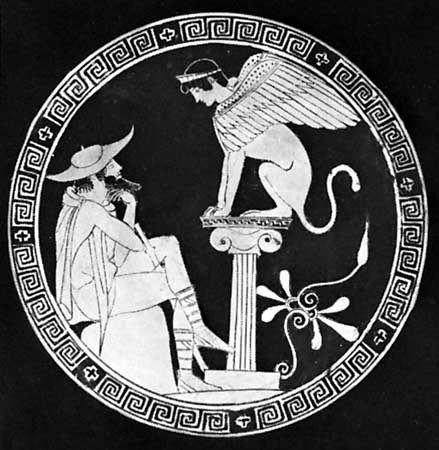Oedipus
Greek mythology
in Greek mythology, the king of Thebes who unwittingly killed his father and married his mother. Homer related that Oedipus' wife and mother hanged herself when the truth of their relationship became known, though Oedipus apparently continued to rule at Thebes until his death. In the post-Homeric tradition, most familiar from Sophocles' Oedipus the King and Oedipus Coloneus, there are notable differences in emphasis and detail.
Traditionally, Laius, king of Thebes, was warned by an oracle that his son would slay him. Accordingly, when his wife, Jocasta (Iocaste; in Homer, Epicaste), bore a son, he exposed the baby on Mt. Cithaeron, first pinning his ankles together (hence the name Oedipus, meaning Swell-Foot). A shepherd took pity on the infant, who was adopted by King Polybus of Corinth and his wife and was brought up as their son. In early manhood Oedipus visited Delphi and upon learning that he was fated to kill his father and marry his mother, he resolved never to return to Corinth.
 Traveling toward Thebes, he encountered Laius, who provoked a quarrel in which Oedipus killed him. Continuing on his way, Oedipus found Thebes plagued by the sphinx, who put a riddle to all passersby and destroyed those who could not answer. Oedipus solved the riddle, and the Sphinx killed herself. In reward, he received the throne of Thebes and the hand of the widowed queen, his mother, Jocasta. They had four children: Eteocles, Polyneices, Antigone, and Ismene. Later, when the truth became known, Jocasta committed suicide, and Oedipus (according to another version), after blinding himself, went into exile, accompanied by Antigone and Ismene, leaving his brother-in-law Creon as regent. Oedipus died at Colonus near Athens, where he was swallowed into the earth and became a guardian hero of the land.
Traveling toward Thebes, he encountered Laius, who provoked a quarrel in which Oedipus killed him. Continuing on his way, Oedipus found Thebes plagued by the sphinx, who put a riddle to all passersby and destroyed those who could not answer. Oedipus solved the riddle, and the Sphinx killed herself. In reward, he received the throne of Thebes and the hand of the widowed queen, his mother, Jocasta. They had four children: Eteocles, Polyneices, Antigone, and Ismene. Later, when the truth became known, Jocasta committed suicide, and Oedipus (according to another version), after blinding himself, went into exile, accompanied by Antigone and Ismene, leaving his brother-in-law Creon as regent. Oedipus died at Colonus near Athens, where he was swallowed into the earth and became a guardian hero of the land.Oedipus appears in the folk traditions of Albania, Finland, Cyprus, and Greece. The ancient story has intense dramatic appeal; through Seneca the theme was transmitted to a long succession of playwrights, including Pierre Corneille, John Dryden, and Voltaire. It has had a special attraction in the 20th century, motivating Igor Stravinsky's secular oratorio Oedipus Rex, André Gide's Oedipe, and Jean Cocteau's La Machine infernale. Sigmund Freud chose the term Oedipus complex to designate a son's feeling of love toward his mother and jealousy and hate toward his father, although these were not emotions that motivated Oedipus' actions or determined his character in any ancient version of the story.
- Osa
- Osage
- Osage orange
- Osage River
- Osa Johnson
- Osama bin Laden
- Osamu Shimomura
- Osa Peninsula
- Osasco
- Osawatomie
- Osbern Bokenam
- Osborne, Dorothy, Lady Temple
- Osborne, John
- Osborne Reynolds
- Osborne, Thomas Mott
- Osborn, Henry Fairfield
- Osbourne, Ozzy
- Oscan language
- Oscar Arias Sánchez
- Oscar Charleston
- Oscar de la Renta
- Oscar Hammerstein, II
- Oscar Handlin
- Oscar Hijuelos
- Oscar Homolka